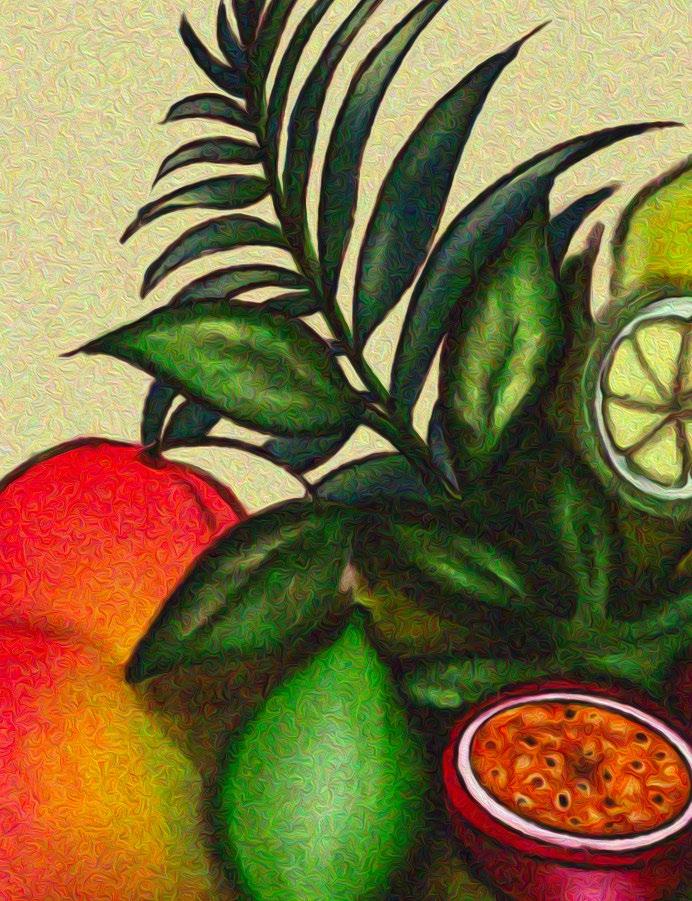




Celebrating shared heritage & uplifting Loyola’s diverse Hispanic/Latino community
Editor in Chief
SOPHIA MAXIM
Wolf Editor
ELINOR UPHAM
Executive Editor
MATTHEW RICHARDS
Managing Editor
ELOISE PICKERING
Digital Director
FRANCISCO ESTEVES
Dear Wolf readers,
As Hispanic Heritage Month comes to a close, we want to highlight and celebrate the diverse and vibrant Hispanic and Latino community here at Loyola University. Hispanic Heritage Month is a time to recognize the contributions, cultures, and histories of Hispanic and Latino Americans.
Loyola boasts a wonderfully diverse campus with students, staff, and faculty from all around the world. Hispanic and Latino students represent about 20% of Loyola’s undergraduate population.
This edition is full of the passionate interests and endeavors of the Hispanic and Latino student community at Loyola, and I am so grateful for the contributions and
hard work of everyone involved with this edition.
I hope that The Wolf opens your eyes, reaffirms your experiences, and shines a light on the wonderful Hispanic and Latino community at Loyola.

Elinor Upham
Editor, The Wolf Magazine
Creative Director
TAYLOR FALGOUT
Cover Designer
PATRICIA CABRERA-SOLDEVILA
Page Designers
DANIEL GARCES
ISABELLA CASTILLO
DANIEL WONG
ISABELLA ZABELATA

A Profile Series
By Alyvia Pierson
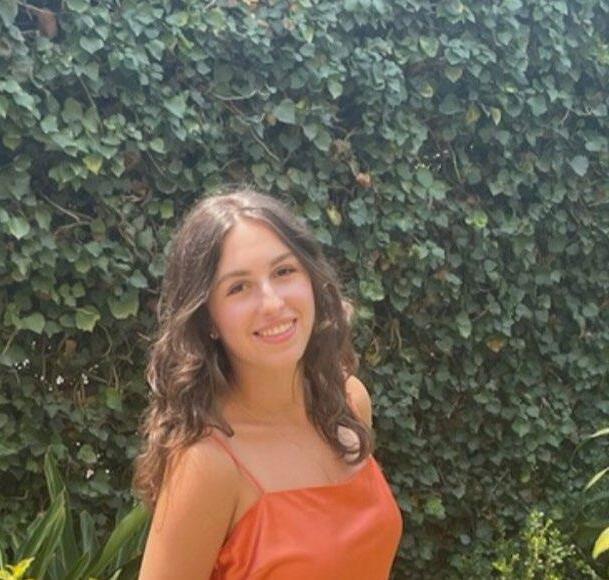
Ana Paz Carrerras moved around throughout her childhood because her father worked for the U.S. Embassy. Her family moved from Ecuador to Peru, Mexico, Texas, Maryland, Honduras, then back to Mexico.
“I feel like moving around and adapting is very personal to me and obviously [a struggle]. The hardest part was leaving [more so] my family than the actual place,” environmental science major freshman Carrerras said.
Passionate about nature and wildlife, Carrerras’ academic focus is on zoology and the environment. She conducted research and wrote a paper on sustainable agriculture in Ireland for the World Food Prize Foundation.
“I was opened to the world of environment, agriculture, food security, and sustainability,” she said. “There’s so many job offers in this field, and it’s something that I’d really like to do, because I really want to help people.”
When choosing a university, a convincing representative from Loyola had Carrerras sold.
“The person who came to my school knew a lot about the environmental science program and talked about the greenhouse on the top of our arts and science building,” Carrerras said, “I was very interested from there.”
Carrerras feels her intuition to choose Loyola was right. From being welcomed by students, to being cared about by professors, Carrerras’ time at Loyola so far has been wonderful.
“It reminded me of a lot of my old schools where everybody opens the door for each other. It’s just a small detail, but it really shows the goodness in everybody,” Carreras said, “People really want to see you succeed, instead of it being a cutthroat community.”
Carrerras said she has her heart set on living in Australia, She hopes to study abroad and eventually work there. Before
going to Australia, Carrerras plans to implement her Loyola education in environmental issues back home. Puerto Rico has been continuously damaged by hurricanes in recent years. The beaches and wildlife are Carrerras’ focus to restore and conserve the island’s beauty and its smallest creatures.
Another passion of Carreras is her identity as a Latina woman.
“I feel like Latino people are very open, very loud at times,” she said. “But it’s also a way to be comfortable with the unknown. We see a lot of joy in life from music to dancing. I love that.”
Although Carreras said she loves Latino celebrations, she wishes Hispanic Heritage Month was clearer and more distinct.
“It’s all under one umbrella. Hispanic doesn’t technically refer to Latin America, it’s more so related to Spain. Latin America and Spain have completely different cultures, and so does Latin America itself,” Carrerras said, “There’s Central America, South America, and the Caribbean. I’m happy there’s a month dedicated to us, but I wish there was more information about it, because it’s still very broad.”
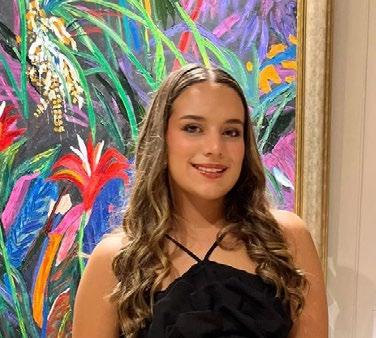
Sofia Costa said her father inspired her to study finance. Costa’s dream is to be a successful businesswoman and investor.
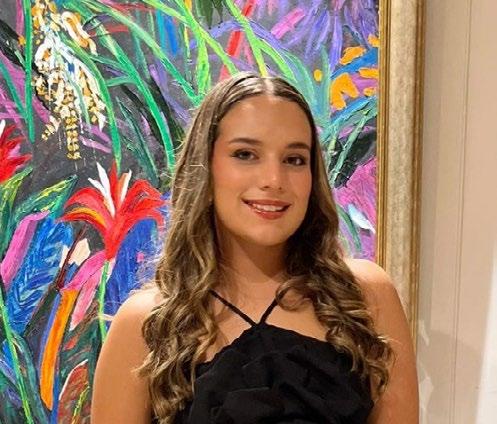
“I never saw myself going in a different direction other than that,” the international business freshman said, “I want to be rich, and I believe business can get me there.”
Prior to applying to Loyola, Costa had her eyes set on other schools like the University of Central Florida, Baylor University, and Bentley University, a prominent business school. It wasn’t until her father suggested Loyola Chicago, that she discovered Loyola New Orleans. Ultimately, Costa said she received a generous scholarship from Loyola New Orleans and committed soon after.
“Loyola has a good sense of community, compared to the other schools I applied to,” Costa said, “it truly is a tight community and it’s very welcoming and accepting.”
As her freshman year approached, Costa said she expected to have the

Pablo Pineiro is a political science freshman from Puerto Rico. Pineiro wants to play a role in policymaking because he recognizes how politics heavily influences people’s lives. Pineiro said he was motivated by his high school, a Jesuit institution, to apply to Loyola.
“They really preach the same values and promote schools like Loyola,” Pineiro said.
Denying his other top contenders, Pineiro said he received a generous Jesuit scholarship and chose Loyola New Orleans to call home.
“Eighty-five percent of students live on campus, so that was a major difference compared to the other schools I applied to,” Pineiro said, “and, the fact that [Loyola] was medium sized to small was very important to me.”
So far, Pineiro said his experience has been nothing short of liberating.
“It’s been very fun, because I can just
“American college experience,” referring to TikTok reels of college life. However, the goodbyes to her family and friends took a toll on her.
“When I said goodbye to my Mom, it became hard; that’s the moment I felt the weakest,” Costa said.
Additionally, her grandfather and little sister traveled with her to the U.S. to help Costa move in.
“Saying goodbye to all three of them broke me. I just couldn’t believe that I was not going to have them two minutes away from me,” Costa said, “and now that I have been here for a little while, I have been missing Ecuador.”
Fortunately, Costa said she’s had her own version of the “American college experience.”
“One of my friends texted and asked me, ‘Hey, there’s this international student thing happening. Do you want to come?’ and I was like, ‘Yeah, sure!’” Costa said. “[Loyola] offered transportation, and we ate po’boys and cookies and the whole thing was really beautiful.”
International student gatherings like these allowed Costa to meet and make friends of the same background. In another encounter, Costa said she met some of her dearest friends.
“Whenever I hear somebody speak Spanish, I [approach] them and ask,
take the streetcar anywhere and go whenever I want,” Pineiro said.
In contrast, Puerto Rico had limited public transportation compared to the accessibility of New Orleans, which he said was a pleasant surprise.
He appreciates the welcoming atmosphere Loyola offers to international students.
“[Loyola] is a very interesting and diverse campus,” Pineiro said, “there are a lot of activities for Hispanic and Latin American students.”
Events and such catered to those of Hispanic and Latin American descent, allowed Pineiro to connect with others of similar backgrounds. He wants to use the communities he met to become more fluent in English.
Leaving home to study in another country came with its sacrifices.
“It was hard leaving my family and people I know there. My parents made an economic sacrifice for me to come here, so I’m grateful for them,” Pineiro said. Culturally, the biggest difference between the U.S. and Puerto Rico to Pineiro is the way people greet one
‘where are you from?’, in Spanish and they reply in Spanish,” Costa said, “and from there, it’s Latina bonding. I met my friend group like that.”
Costa credits her spirited personality for her achievements. Of her high school senior class, Costa was chosen to earn the Delta award for upholding Catholic values.
“I’ve always been the type of person who cares more about other people than myself,” Costa said.
She believes the biggest way she can contribute to Loyola is by being a force of good. After all, a little kindness can go a long way. Additionally, Costa wants to implement the Jesuit values embraced at Loyola back home in Ecuador.
“They’re so beautiful and genuine,” Costa said.
Another concept Costa admires is Hispanic Heritage Month. While America has its own traditions and celebrations like the Fourth of July and Thanksgiving, Costa is grateful that September is dedicated to people like her.
“There are so many immigrants coming from different countries, who apply for green cards. It’s very sweet to see them represented in the U.S.,” Costa said, “After all, the U.S. is a mix of all cultures from different places, so it’s very cool to see my people being represented.”

another. While Puerto Ricans are more open to hugging somebody they know passing by, Americans just give a wave and smile. Pineiro said this was a noticeable yet simple thing he had to adjust to.
For Pineiro, the opportunities at Loyola and in the U.S. outweigh what he left behind in Puerto Rico. He even plans to settle here after graduation. “I’d like to do volunteer work anyway I can, because I did it at my high school and I really enjoyed it. I could maybe do something with the homeless [population],” Pineiro said.
Pineiro said while he’s not technically an international student, he shares some similar experiences.
“I’m not an international student regarding my scholarship, [other financials], and as a Puerto Rican, I am a US citizen. But I do feel like one, [at the same time], because culturally, we speak a different language,” Pineiro said, “To a certain degree, I do feel like I’m just as much of an international student as someone from Honduras or Nicaragua.”
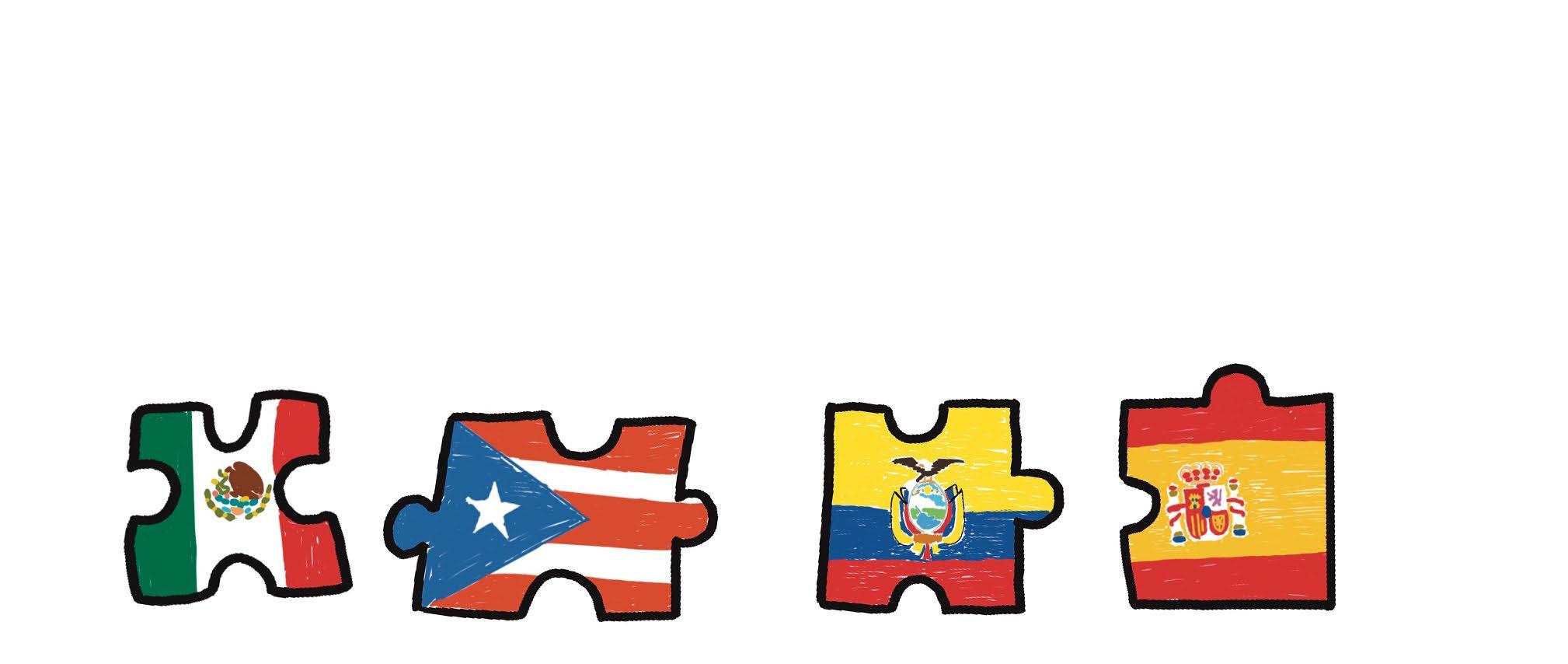

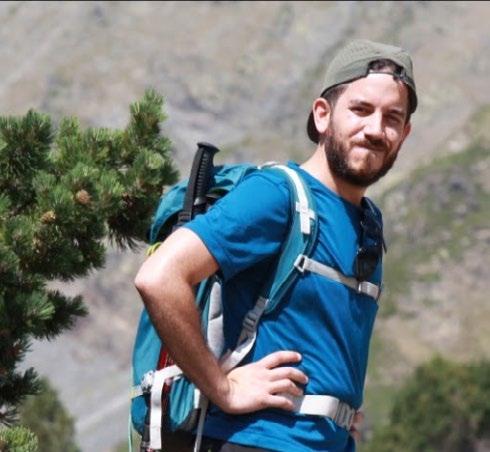
Santi Macias from Barcelona, Spain returned to university to start his second bachelor’s degree in computer science at 36.
In 2012, Macias graduated from Universitat Politècnica de Catalunya in Barcelona, Spain with a degree in mechanical engineering. In 2017, Macias met his wife, a Spanish native, while she was attending the John Jay College of Criminal Justice to get her PhD.
In 2021, he quit his latest engineering job at a multinational company in Barcelona to move to New York to be with his wife after two years long distance.
“[I spent] eighty percent of my time in New York. I would come for Easter, [my wife] would come to Barcelona for the summer, I’d go back in October and November, and she’d come for Christmas,” Macias said.
Macias was hired as data analyst later that year at a marketing firm for his background in engineering, but his position left him longing for more.
“[When I studied engineering], I
did some courses in programming, mathematics, informatics, and software. But I didn’t have any real knowledge in IT,” Macias said, “so, I thought I should get some experience in the field, which led me to Loyola.”
Macias’ wife accepted a position at Loyola as a criminology professor after finishing her PhD.
“She really wanted to be here because of the program, the city, and Loyola,” Macias said.
Taking a leave of absence from his marketing job, Macias moved to New Orleans to get his computer science degree at Loyola. As a student, Macias received a tuition-free education as a spouse of the faculty. As an adult getting his second degree, Macias said his experience at Loyola has been quite the adjustment.
“Sometimes I feel out of place, because of my unique situation. If I was in my 20s, it would be wonderful. So, it’s a big change for me,” Macias said.
Furthermore, when seeing his friends advance in life by getting married, having kids, buying houses and such, Macias said it reminds him that they’re all at a different point in their life.
Despite this, a window of opportunities opened for Macias. Universities have changed since he last attended, and being able to have access to more resources was
eye-opening for him.
“Studying here, all the resources [I] have are great. In Spain, education was all I had; school was just a place where you go to study and nothing more,” Macias said, “Here, it’s the full experience. [There is] everything here.”
The Center for International Education has been a major benefit to Macias, he said, especially during orientation week. At the CIE for a meeting, Macias was inspired to lend a helping hand to those new to foreign nations. He overheard two girls signing up for a January term study abroad trip in Europe.
“I would love to help and give my opinion and recommendations to people traveling to Barcelona, like where to stay, visit, and eat,” Macias said. “I’m sure I can contribute in any way.”
Macias considers himself to be more Catalan than a part of the traditional Spanish ethnicity.
“In Catalonia, we have our [own] traditions and food, so I [feel] more Catalan than Spanish. But when someone asks me where I’m from, I say I’m from Spain,” Macias said.
To Macias, Hispanic Heritage Month means “unity but also diversity.”
“Behind every person, there’s a story. So, yeah, why not celebrate? Regardless of someone’s background, they deserve recognition in some way,” Macias said.
By Julia Bueno
Hispanic and Latino students make up the second largest ethnic group at Loyola New Orleans, with students hailing from Central and Latin America, as well as the Caribbean. Many come seeking opportunities they may not have back home—whether it’s advancing their education, discovering new paths, or simply experiencing a change of scenery. To support this vibrant community, Loyola fosters over ten organizations dedicated to helping Hispanic students thrive, find belonging, and connect with one another.
Of the ten, the International Student Association stands strong with the most members on HowlConnect. Of those members, about 60% of them are Hispanic/Latino. This diverse group brings together students from across the globe, offering a space where international students can build community, share their cultures, and support one another through their Loyola journey.
Camila Espinosa, a senior from Quito, Ecuador, majoring in marketing and international business with a minor in mass communications, serves as the Marketing Director for the ISA.
“ISA is all about connecting cultures,” Espinosa said. “We bring international students together and give U.S. students a chance to explore the world right here on campus.”
For Camila, Hispanic Heritage Month is more than just a celebration—it’s a time to reflect on the richness of Hispanic history, traditions, and achievements.
“Hispanic Heritage Month is about recognizing and celebrating the richness of Hispanic culture, its history, passion, traditions, struggles, achievements, and the strength of its community,” she said. “It’s a time to honor the profound impact Hispanics have made on shaping society while acknowledging the challenges they continue to overcome.”
Many recognize the ISA for its annual international food festival, the largest event on campus during Hispanic Heritage Month.
“This semester, we’re aiming for something even bigger—more tables, more music, and more attendees,” said ISA president Paola Ameglio.
Among the countries represented will be Puerto Rico, the Dominican Republic, and Panama, offering their traditional dishes.
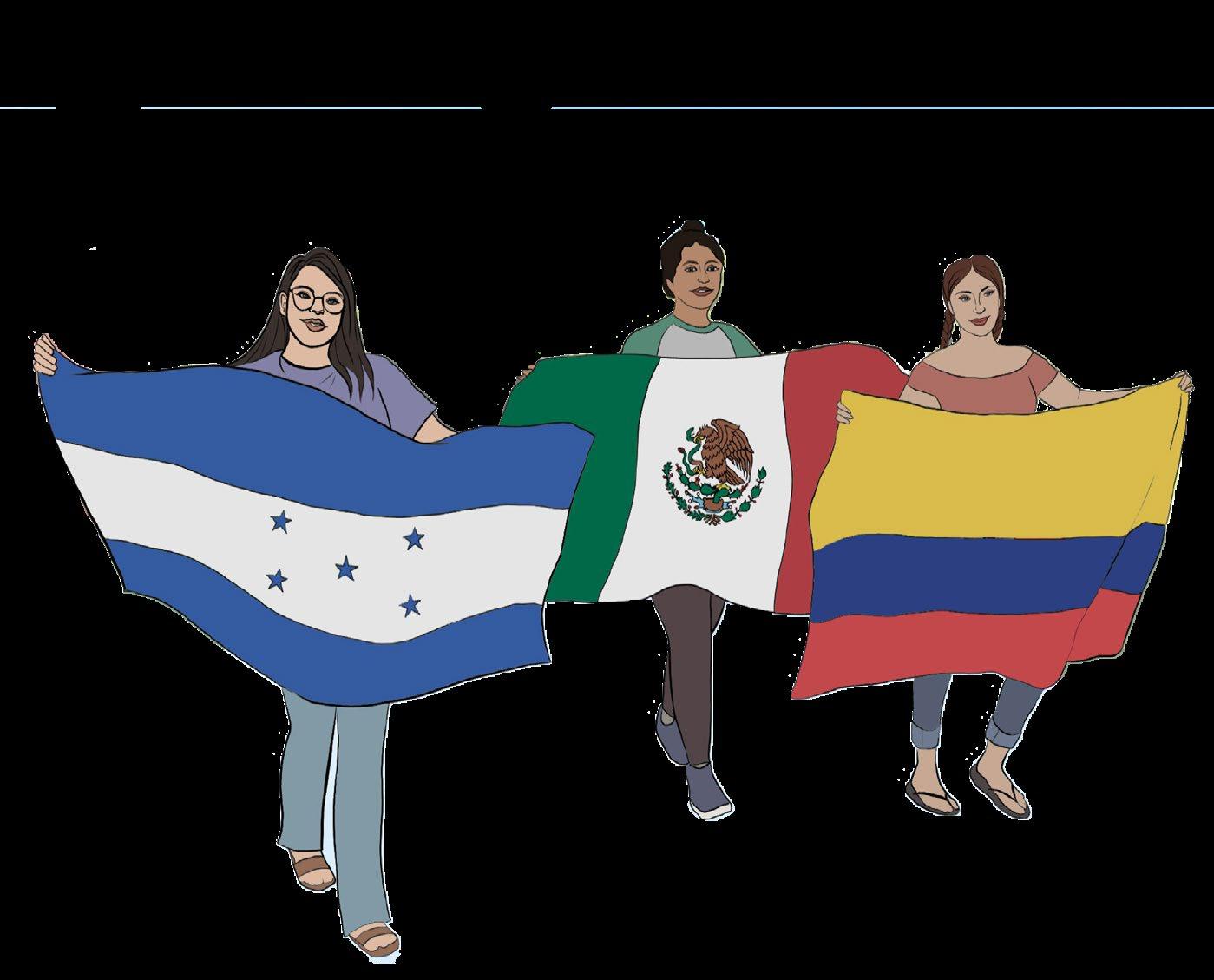
Before the Puerto Rican Student Association was established, many Puerto Ricans were part of CASA, Loyola’s Caribbean and African Student Association.
CASA’s mission is to educate the Loyola community about the values, histories, and cultures of the Caribbean and African regions while fostering cultural appreciation and inclusivity.
“We aim to unite students of Caribbean and African descent, as well as those interested in these cultures, to create a supportive network and a sense of belonging,” said Royale BaezTrinidad, CASA’s Director of Media Relations from the Dominican Republic and Jamaica.
Hispanic Heritage Month represents an opportunity to celebrate the rich cultural diversity of Hispanic and Latino communities. CASA sees this month as a chance to foster collaboration with other student organizations and promote inclusivity.
The CASA editorial board stated, “Through collaboration with the Hispanic Alliance Organization, we were able to host a dance party. We also plan on doing a Student and Faculty Spotlight to appreciate members of these unique cultures.”
One of the newest organizations on campus, the Puerto Rican Student Association (PRSA), was officially approved three semesters ago by the Student Government Association.
Another organization is the Hispanic Alliance, co-founded by Melody Perez. Perez is a senior marketing major with a minor in social media from Honduras and Guatemala, who also serves as the organization’s communications director.
“We’re a growing organization and hope to be a safe space for all of our Hispanic students here at Loyola,” said Perez. “We want to be an organization of comfort and understanding, but also a space where everyone can emerge in our cultures, learn, and have fun with us.”
This semester, the Hispanic Alliance kicked off Hispanic Heritage Month with Hispanic Heritage Week, a week-long celebration of different heritages and cultures.
“We hosted a series of events for the beginning of Hispanic Heritage Month and hope to partner with more organizations throughout the month,” Perez explained.
Perez emphasized the importance of the month as an educational opportunity.
“It’s a way to reflect on our cultural differences, empower Latin voices, and let others immerse themselves in our experiences—not because it’s our job to educate them, but because we create the space for them to learn if they choose to,” Perez said.
Perez expressed deep gratitude for the support she’s received from individuals like Kyleah Bell, the organization’s advisor.
“Kyleah really embraced our ideas and helped us bring them to life. She gave us all the support she could, from encouraging us to start the Hispanic Alliance to backing our various events,” Perez explained.
While Melody Perez appreciates the diversity at Loyola, she acknowledges that more can be done at an institutional level to fully embrace and highlight it.
“I feel as though we are a very diverse university, and that’s one of the things that drew me to Loyola, but there’s always room for improvement,” she said.
By Anna Seriot
Pablo Monasterio
Business administration senior Pablo Monasterio is from Barcelona, Spain. Monasterio said Barcelona offers a whole range of activities to do, from strolling through parks such as Parc Guëll, to sampling tapas and drinking the cervezas, or beers, in bars, to visiting monuments such as La Sagrada Familia.
According to Monasterio, Barcelona’s strong point is its food, including fish, olives, tapas and tomato bread. On top of its cultural and architectural appeal, the town offers festivals such as Sant Joan celebrating the birth of St. John the Baptist, which is Monasterio’s favorite, when all the townspeople set off fireworks. What’s important to remember, he said, is the friendliness and good attitude of Spaniards to each other and to strangers.
Monasterio said he appreciates the European influence in New Orleans, especially the French Quarter.
“If you go to the French Quarter without knowing that it is in the United States, nobody could guess that it is American. and that’s what I like about it,” he said.
However, when Monasterio arrived in New Orleans, he said he experienced culture shock when witnessing the level of poverty.
“We did a road trip all over the city,” he said. “and there are areas, like under bridges there were maybe 30 or 40 people staying there, and that’s sad.”
Monasterio believes it’s a good idea to celebrate Hispanic culture to educate people on cultural misunderstandings like the difference between European Spaniards and Latin American people.
Business management junior Belen Rodriguez-Caso Lopez is from Seville, Spain. According to her, there’s always something stimulating to do in Seville, like going out with friends in the lively streets. What she prefers about her city is people’s friendly attitude and their ability not to judge others, she said.
Of the many events organized in Seville, Lopez’s favorite is “the Holy Week,” a festival that happens once a year and lasts a week. The inhabitants of the city follow a statue of Christ around Seville. Music, food, laughter and song are the order of the day. The day is intense and can be confusing for tourists, she said, but it’s a great way to get to know the culture.
Lopez said while New Orleans shares Spanish origins and friendliness, she believes the level of insecurity and mistrust is higher than in Seville.
“In Spain, we trust each other more. In restaurants, you can leave a bag on the chair while you go to the toilet without fear of it being stolen,” she said.
According to Lopez, celebrating Spanish culture through Hispanic Heritage Month allows people to remember stories of Hispanic culture.
Music industry sophomore Mathias Juardo is from Mexico City, Mexico. According to him, the architecture of Mexico City combines French, Spanish, Chinese and even New York’s influence. The main asset of Mexico City, he said, is that everything is within reach.
“It’s safe, you can walk and that’s what I like the most,” he said.
According to Juardo, Mexico City has a reputation of being dangerous, which stops people from visiting despite its food, music, bars and temperature because of prejudices.
Juardo said he appreciates the streetcars, walkability, history, and jazz culture of New Orleans.
Juardo said he has mixed feelings about Hispanic Heritage Month because although it’s well-intentioned, it sometimes focuses on differences over inclusion.
Marcos Salas Contrera
Business management junior Marcos Salas Contrera is from Seville, Spain. For him, he said Seville is one of the most beautiful Spanish cities, even if it is not a very big city. People are very openminded and friendly in Seville and in Hispanic culture in general, he said.
“Iis very easy to make friends," in Seville he said.
Southern Spanish architecture takes influence from Islam and Catholicism, Contrera said. Contrera’s said his favorite festival is the feria, which celebrates livestock breeding. The bulls deemed most beautiful are paraded through the streets, and the public rides in horsedrawn carriages to the bullfights.
Contrera said while Spain is a small country, he wants people to know how diverse it is.
Coming to New Orleans was a huge shock because he finds Bourbon Street overwhelming, he said. He also believes that the level of security is not the same as in Seville.
“The area of Loyola University is really safe, but I am a little bit scared of the city center,” Contrera said.
Contrera has noticed some cultural differences with studying and work. He said that in Seville “people work to live, but here [in New Orleans] people live to work.”
To Contrera, he said celebrating Hispanic culture through Hispanic Heritage Month is a good idea because the United States is a country made up of many cultures.
Valeria Lima
Business administration masters student Valeria Lima is from El Salvador. Lima said she wants people to know that El Savadorian people are very generous. "If you ask them for the address of a restaurant, they will not only give you the address of the restaurant but also all the attractive activities to do in the country," she said.
Lima said her country is rich with volcanoes, lakes and temples, and a history of the Mayan and Olmec civilizations. To Lima, she said El Salvador is “like paradise.”
Valeria arrived in New Orleans this year. She said she thinks the architecture in the French Quarter makes New Orleans different from other American cities. Nevertheless, she points out that public transports are not practical, so it’s necessary to drive around the city.
Even though the population of New Orleans is very welcoming, she said, people are still less friendly than in El Salvador. As for Hispanic Heritage Month, Lima doesn’ want to celebrate it due to the history of Spanish colonization in El Salvador.
El Salvador was colonized by the Spanish from the mid-16th to the mid-19th century. During these three centuries of colonization, the Spaniards worked hard to convert the Indians to their European
religion and way of life. The Salvadorans don't celebrate it because they consider it a Spanish celebration.
One of her favorite things about her country is the quality of food, she said. She loves pupusas especially, a dish made of corn cake with cheese and fried beans.
Lima said her family follows specific holiday traditions like opening gifts at midnight on Christmas Eve.




A Profile Series
By Matthew Richards
Junior tennis player Micaela Ponce, a Quito, Ecuador native, has been playing tennis with her family since she was four.
“I always knew that I wanted to come play in the States,” she said. “My parents and my brother had already come and played tennis here in the U.S., so it wasn’t that big a deal that I decided to do it as well.”
A graphic design major at Loyola, Ponce said she relishes every chance to return home and reconnect with the natural beauty of Quito. She describes the experience of being on her home tennis courts surrounded by mountains as “surreal” and something she wishes more people could experience.
“Quito is home,” she said. “It’s my favorite place in the world. I’m just so
happy when I’m there. The first thing I go to do when I get back home is eat ceviche, which is my favorite food. I really love going to my farm back home, riding horses and just kind of escaping from the city.”
However, Ponce said New Orleans reminds her of Ecuador in many ways.
“I love it here in NOLA,” Ponce said. “I love the people, and it kind of reminds me of the Spanish and Latino culture back home the way they are so welcoming and nice. I have friends at other schools in the U.S. who talk about how the culture there is so different from home, but for me it’s really not. So I didn’t really have a cultural shock when I came here.”
She said moving to the U.S. did present more challenges than she thought. When she arrived at Loyola, she said
the way things were taught took some adjustment.

“The process of coming to Loyola wasn’t as hard as it could have been, because I had been studying English since I was really little,” she said. “But it’s been a whole new teaching style for me to adjust to that I didn’t know about until I actually got here and lived it.”
At Loyola, Ponce said she’s been able to find a community that has helped her deal with some of the homesickness.
“There’s a lot of international people in tennis and on our team, and I’ve been lucky to find a group of friends who are also international students and my roommates have been as well,” she said. “It can get overwhelming sometimes, not being home with your parents or them not being close by, but I feel like it makes me a stronger person.”

Golfer and business analytics senior Marco Olano said he’d always hoped to play golf in the United States.
“It has been my dream since the day I started playing golf at 11 years old to play in the U.S., so I was thrilled and happy to be able to live this experience,” he said.
Olano grew up in San Salvador, the capital of El Salvador. In his childhood, he said he loved eating pupusas and playing soccer and golf.
“I played both until I was 14, when I realized that I wanted to dedicate my full time to become a better golf player,” he said.
Olano said the distance between his hometown and the U.S. posed an obstacle between him and his dream.
“It is much harder for us international athletes to get the exposure that U.S. athletes get, therefore I had to travel from my home to the U.S. in order to play tournaments in which college coaches could see me play,” he said.
Playing so far away from home means Olano doesn’t get to see his family often.
“I basically just get to see my family twice a year [on breaks],” he said. “I always try to call them everyday just to keep in touch and tell them how my game and
Indoor and beach volleyball player
Kala Emanuelli said she has enjoyed the growth she’s achieved in her time at Loyola.
Emanuelli, a marketing junior, joined the Wolf Pack from San Juan, Puerto Rico. Growing up, she said she knew she wanted to attend college in the United States, regardless of whether she was able to play volleyball.
“It was always an option for me growing up,” she said. “My parents knew that they wanted me to get an education outside of Puerto Rico and have that experience because my dad knew how much his experience [as a St. Louis University graduate] helped him learn and grow as a person. Getting to also play volleyball while I’m doing it is just an added bonus.”
Emanuelli said she’s been grateful for the opportunity to be an international student athlete.
“I feel like it kind of gives me the best of both worlds in a way,” she said. “My freshman year, all of my teammates were from the United States and through them, I made a bunch of friends from the U.S. But I also got to meet people from places like Ecuador, Honduras, Costa Rica, and Puerto Rico through my classes, so it’s definitely helped give me a wider group of friends and the chance to communicate

because it’s in a city, and it’s not exactly close to home, but it’s also not really far either, especially since there are now direct flights from here to San Juan.”
She said she also found a big connection between Loyola and Puerto Rico as she did more research into the school.
“I started to realize how many people that I knew either graduated from here or knew someone who graduated from here and that let me know that the school was pretty diverse, and that really caught my attention too,” she said.
Emanuelli’s time in America has been fruitful for both her and the Wolf Pack, as she has enjoyed growing and developing both on and off of the volleyball court.
“I’ve really gotten into country music since I’ve been here,” she said. “I really like Morgan Wallen and Luke Combs. ‘Beautiful Crazy’, which is by Luke Combs, is one of my favorite songs right now.”
Emanuelli said she’d encourage any athlete considering leaving their home country to come to the U.S. to pursue their athletic and academic goals.
“I feel like there might be some people who are scared to do it because they feel they’ll be a minority here, but I think it’s definitely worth the risk,” she said. “You’ll get used to being away from home, and it’s definitely an experience worth taking the risk for.”
However, Emanuelli also recognizes that her situation can present unique challenges, as she discovered in early
“When the hurricane hit campus a few weeks ago, most of my teammates could just be like ‘Oh, I’m just going to drive home and leave,” Emanuelli said. “But I couldn’t just get on a plane and fly home,
The distance from home required her to take a leap of faith when choosing Loyola,
“Because I’m from Puerto Rico, I didn’t really get the chance to come visit and see the campus before I committed here,” she said. “I had no idea what New Orleans was like when I decided to come here, so that was really the most difficult part of the process for me. But I feel like that kind of made it more fun too, not knowing
However, once she was able to come and visit campus, she said she felt right at
“I had never heard of Loyola before, but I liked it because the weather here in New Orleans is great,” she said. “I felt like it wasn’t all that different from home
Finance senior tennis player Diego
Rodriguez is from Panama City, Panama. He says his older brother inspired him to start playing tennis competitively. He saw college as an opportunity to play at a competitive level for four more years.
“It was an amazing chance to me,” Rodriguez said.
Rodriguez said the traveling he did in his juniors tennis career made his transition to the U.S. easier.
“Because I have traveled a lot during my life, I did not feel as homesick as I thought I would,” he said. “This helped me enjoy the journey a lot more. Although I miss having a beach nearby, because I like to spend a lot of time there.”
Rodriguez said traveling abroad for school can be an experience of personal growth.
“Being able to share different experiences and learning from other points of view is the best,” he said.
“Learning from other cultures is what I think makes traveling so appealing and being able to study and grow somewhere that is not home is a great opportunity.”
By Daniela Martinez
Some Puerto Rican students living in the United States said they recently had to make a difficult decision. They must choose between abstaining from voting, voting in Puerto Rico’s government elections, or relinquishing that right in order to vote in the presidential elections.
“This was the first election that I actually considered registering in the US. But at the end of the day, I think that especially in Puerto Rico, this is one of our most important elections. If the system does not improve nor will the other systems, so doctors will leave the island, education will worsen and so on,” said Virginia Armstrong.
Considering the state of the island, Armstrong said, she fears that if there is no change in this election, her dream of moving back to Puerto Rico, getting a job, and raising a family will not be possible.
Puerto Rico and other territories are governed by the Territorial Clause in the Constitution which says that the United States government’s decisions are sovereign over the territories, according to Sean Cain, associate professor of political science.
According to the Constitution, despite a sovereign rule Puerto Ricans are only allowed to vote in the Presidential primary election, but no other federal election. They are also allowed a resident commissioner which is a non-voting member in the House of Representatives. However, if a Puerto Rican moves to any of the states or the District of Columbia, they are allowed to register in U.S. elections if they are not registered in Puerto Rican elections.
Senior Francisco Esteves, who registered to vote in Louisiana, said that registering in the states was a difficult decision because both elections will have a significant impact on him. But he said that at the end of the day, he felt that the presidential election was more crucial for everyone because the political climate in the U.S. feels threatening and scary.
According to Esteves, his decision was swayed by the fact that certain human
rights are under threat this election and because the presidential election will affect his life here and his family’s lives in Puerto Rico.
“I think it’s really important that we not only are paying attention to the election, but that we participate and we vote,” he said. Esteves said he wants to “make sure that we save our democracy and we save our rights, women’s rights, LGBTQ rights, a bunch of different rights that we need to look out for.”
On the other side of the spectrum, senior Virginia Armstrong decided to register in Puerto Rico. Armstrong recalled a crucial moment with her grandmother that influenced her decision. It was the moment she saw her grandmother cry while watching a Puerto Rican candidate make a statement about their plans for Puerto Rico.
“She’s lived through so many, like parts of Puerto Rico’s situations where she has seen the island change. She literally started crying and it was like…how is the island going to be for my nieces and my nephews and my grandkids? She has to think of that. She has to be aware of that, and I’m also aware of that,” said Armstrong.
Some Puerto Ricans who do not align with either election decided not to register or vote. Senior Alondra Juarbe decided not to register because she said it felt like neither election or candidate shared her values or stood for the change she wanted to see.
“We voted for something that was, like, comfortable,” Juarbe said. “Like it’s better to have this one than this one. And I feel like voting for me shouldn’t be about that. It should be like I feel represented. I feel like this goes with my values and everything that I stand for and what I want my future to look like.’”
Despite their differing choices, Esteves, Armstrong, and Juarbe each expressed fear for the future of Puerto Rico after the presidential election.
Esteves said that during the 2016 and 2020 presidential elections, he was
scared of the outcome and felt powerless because he was not of voting age and did not live in a state. Now, living in Louisiana and registered to vote for president he is determined to make his vote count for the sake of his family and himself.
“Now I live somewhere where I can do it, I have the age to do it, and now that I can actually do something about it, I feel like I want to make up for not being able to do something back then because I wasn’t old enough and I didn’t live in a place where I could vote for president,” said Esteves. Similarly, Armstrong mentioned how in the past presidents have passed laws without considering benefits or harms to Puerto Ricans. With this concern, Armstrong said she is scared about who wins this election and what they might do to Puerto Rico, which is already in a delicate situation.
All of these students made different decisions for election day while keeping their values and futures in mind. But regardless of whether they registered or not, they are all worried about the election results and what will happen to the island they call home. Puerto Rico’s colonial status will not change in the foreseeable future, but these students are hoping for an electoral result that will keep them and their families safe.

Loyola senior Alex Martinez and Purdue student Gabriel Morales cofounded Life at Utopia to organize events in the U.S. and Nicaragua. “We are driven by a desire to bring new energy to the party scene, creating unforgettable experiences tailored for our vibrant Latino and Hispanic community in New Orleans and beyond,” Martinez said. “Together, we celebrate culture, connection, and the joy of shared experiences.”
Left: Students dance at a Life at Utopia party on
By Gabriela Santos
For as long as I can remember, my goal for the future has always been the same: to make my family proud by studying in the United States.
Growing up in Puerto Rico was a rollercoaster of emotions; from the long Christmas celebrations, to the beaches I would always go to, and even the number of times the power would (and still) go out. Even though I was excited to study here at Loyola, I was also nervous about this new life; how different would it be? Would it work out? Now, I can proudly say that, as a junior, I have had a blast here and wouldn’t have it any other way.
As Marc Anthony states in his song “Preciosa”: “Porque ahora es que comprendo, que aunque pase lo que pase, yo seré puertorriqueño.” Despite being here in Louisiana, I still feel connected to my small island, whether it’s in the form of the amount of Bad Bunny playing on campus, or the flag of Puerto Rico that I have in my dorm.
Another factor of my time at Loyola that I enjoy is the new people I have met not just from Puerto Rico, but from
other Hispanic and Latino countries and cultures. It feels wonderful to know that I feel welcomed even outside of the comforts of my home.
I also feel that, as a mass communications/advertising major, my identity can also be of assistance in this department. Over the years, we have come to learn to be more accepting and respectful, and I believe that a major reason for this is because of the support people from different backgrounds have received.
I feel that, as a Hispanic/Latina myself, it’s important to hear more about these different cultures and backgrounds. One notable example I can think of is the Donnelley Center, which aims to help out non-profit organizations. A majority of the staff are notably Latino, and this is what I mean when I say that this kind of representation is important.
By having people from different backgrounds, our values and experiences align with these organizations. Essentially, I feel that my identity can help me understand better, and this is why I believe that it’s important to celebrate diversity.
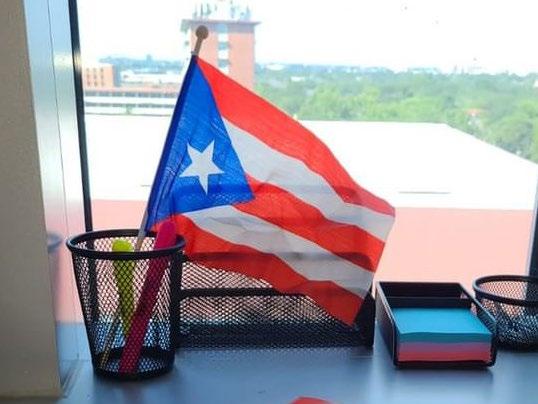
Every time I get back home, either for Thanksgiving break or for Christmas, I feel more connected than before; something that I didn’t think could happen. I’ve lived there my whole life, yet after being separated from my small island in a physical manner, it feels more rewarding and heartfelt.
I am loving my time here in New Orleans and still have dreams of being able to get a job in the United States. My time at Loyola, however, has taught me a valuable lesson: no matter where you go, you never lose sight of who you are. No matter where the wind takes me, I’m proud to say that I’m from the small yet vibrant island of Puerto Rico.
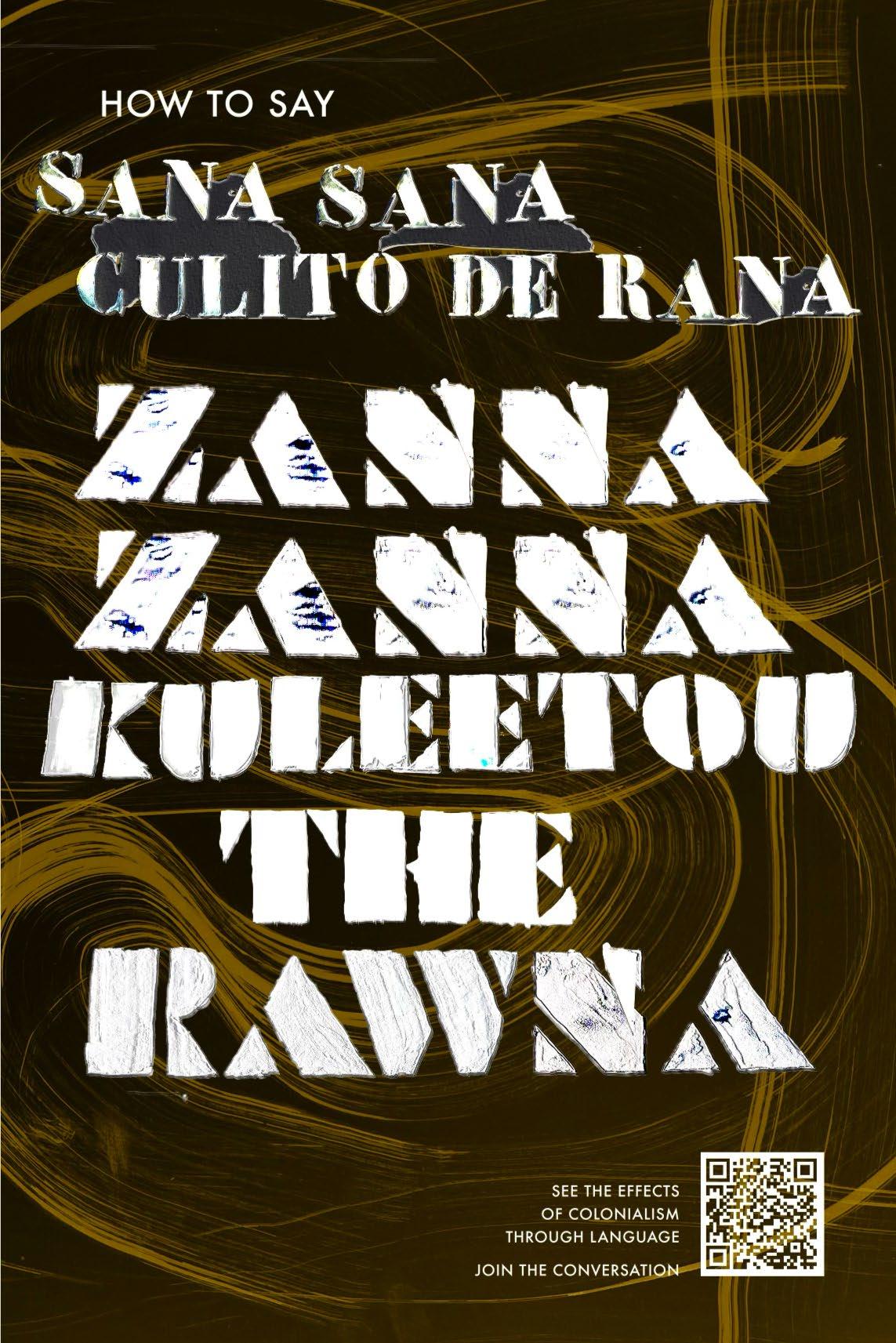
Julia Bueno has a long history of hard work and perseverance. Born in Puerto Rico to a single mother who immigrated from the Dominican Republic, her life has been shaped by stories of her family’s struggles and triumphs. Having grown up seeing her mom’s hard work, she grew up determined to achieve excellence, not just academically, but also in her blossoming career as a public relations professional. Now a senior at Loyola University New Orleans, Bueno has become a standout leader, taking on pivotal leadership roles within the university and beyond.
At first glance, her long list of achievements could seem overwhelming for someone starting college, but for Bueno, it’s a testament to years of dedication and hard work. Just as a public relations major, she has already created a portfolio that many professionals would envy. Bueno’s achievements are as varied as they are impressive. In 2022, she was part of Loyola’s Bateman Team as only a sophomore, a highly competitive national case study competition sponsored by the Public Relations Student Society of America (PRSSA). The following year, she took on the role of Campaign Captain for Loyola’s Bateman Team, leading her team to a national Honorable Mention Award. This recognition cemented her position as a skilled campaign strategist.
These accomplishments only scratch the surface of Bueno’s growing reputation. She currently serves as the Public Relations Director for the Shawn M. Donnelley Center for Nonprofit Communication, where she manages PR strategies and projects for local nonprofit clients. Balancing this demanding position, she is also the Vice President of
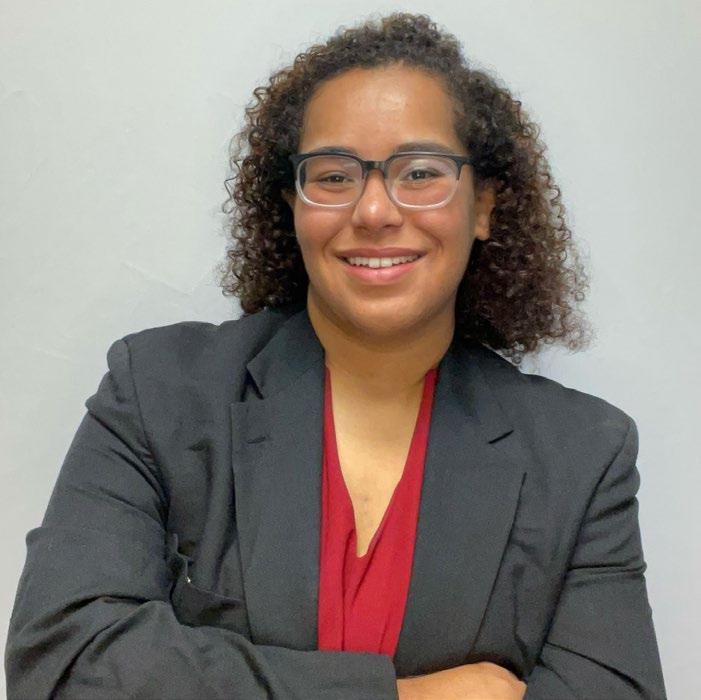
Loyola’s PRSSA chapter, a role that allows her to mentor other students and shape the future of Public Relations education at the university. And as if that weren’t enough, she is also the Public Relations Director for The Maroon, Loyola’s awardwinning student newspaper, where she has used her communications strategies to enhance the newspaper’s image on campus and outreach.
For Bueno, each role she takes on is a step toward achieving her ultimate goal: using her skills to create positive change for her family and community. Growing up, she watched her mom navigate the challenges of building a new life in Puerto Rico after leaving the Dominican Republic, and this experience ignited her drive to succeed.
“Her mom is an immigrant,” says Alondra Juarbe, a childhood friend who has known Bueno for years and now works with her at the Shawn M. Donnelley Center.
“I feel like seeing her mom's hardships growing up is what set her drive. She’s always been so determined to be successful in life to help her mom and change her life. It’s really inspiring to see.”
Alondra describes Bueno as one of the most hardworking people she knows, and it’s easy to see why. Throughout her time in Loyola, Bueno has consistently demonstrated her ability to manage multiple responsibilities while excelling in all of them. In 2021, she served as the Social Media Coordinator for the Organization of Latin American Students (OLAS), where she revitalized the group's digital presence and was able to increase engagement. She was also a nominee for the prestigious 2023
A
Maroon Spotlight By Francisco Esteves
Julia Bueno is one of my longtime friends and colleagues in the Shawn M. Donnelley Center for Nonprofit Communications. Throughout our time at Loyola, I’ve seen her blossom into an outstanding student and public relations professional.
American Advertising Federation (AAF) Awards, recognizing her outstanding contributions to marketing and advertising.
Beyond her campus involvement, Bueno’s real-world experience continues to grow. She has completed internships with notable publications like VIVANOLA Magazine, where she assisted with branding and content creation. She’s now an intern with Almost Anything Inc., where she gained hands-on experience in corporate PR. In Spring 2025, Bueno is set to intern with Where Y’at Magazine, a popular New Orleans-based entertainment and lifestyle publication. These internships, along with her role as Marketing Intern for Loyola’s Office of Marketing and Communications since 2021, have allowed Bueno to build an impressive professional portfolio.
Bueno’s talents extend beyond traditional PR duties. She has a knack for social media management and communications strategies, skills that have become important in the modern communications landscape. Her work with The Maroon, OLAS, and the Shawn M. Donnelley Center has shown her ability to build community and engage diverse audiences.
Despite all her accomplishments, Bueno remains humble. She attributes much of her success to her family and the people who have supported her along the way. She always says that her parents were the best mentors she had in life. Her drive to succeed is as much about giving back to her community as it is about personal achievement.
A Feature
By Pablo Pineiro
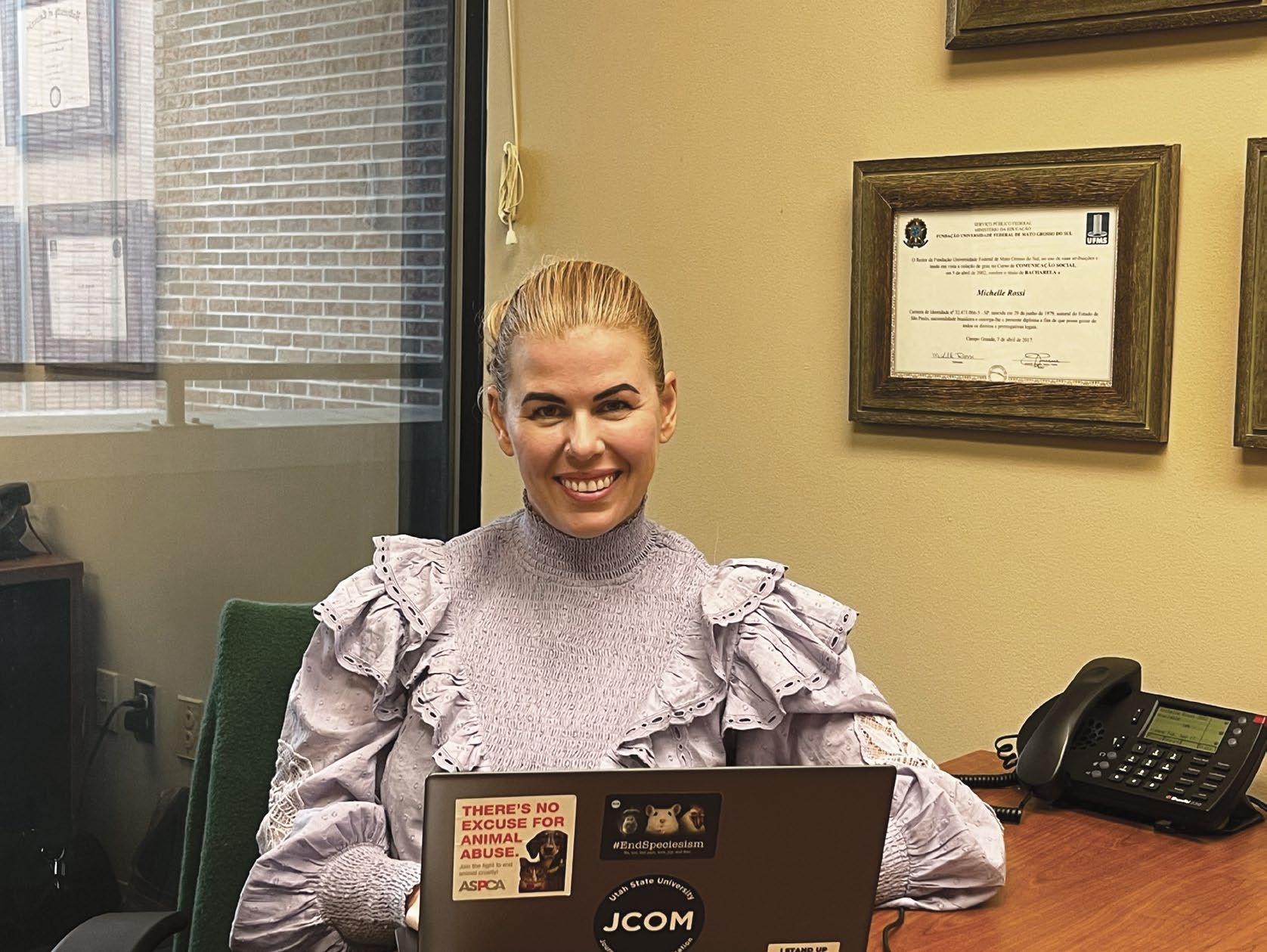
Journalism professor Michelle Rossi is one of Loyola’s newest faculty members. With her home country of Brazil more than 4,000 miles away, she said she still feels at home in New Orleans.
“My family has lived here since the year 2000, but I’ve been living in the U.S. since 2018,” she said. “I didn’t want to come [to the U.S.], but then thought that coming and getting my PhD here would be something nice. Got married here, and now I’m here.”
However, she did not always feel at home in the Big Easy. She said she felt invisible when she arrived in the United States because of the lack of a Brazilian community.
“When I’m filling out a form, and there’s Hispanic, I’m like, ‘I’m not’, so where do I fit?” Rossi said.
As a Brazilian, Rossi is not of Hispanic heritage. However, as someone whose first language is Portuguese, she does fall under the umbrella of Latino, a term that is often used interchangeably with the term Hispanic.
“I really like that you included both the Hispanic and Latino community, because that kind of includes us as well,” she said. “At the end of the day, we’re all part of Latin America.”
Michelle’s journalism work has focused largely on animals. She believes we
should not be seeing nature as separate from us but instead treating animals as beings who are also worthy of rights and protection.
When she became a journalist, she said she felt anxious regarding how animals
“At the end of the day, we’re all part of Latin America.”
-Michelle Rossi, Journalism Professor
are portrayed in the media. When she joined a newsroom for the first time, Rossi said she realized how news stories not related to humans are often pushed aside.
“Every time that we read news stories on the environment, we tend to see nature as an outsider,” Rossi said.
So, she decided to get her master’s degree to learn how the stories of animals can be told as well, she said.
Rossi credits her time as an animal shelter volunteer for her dedication to
animal rights.
Michelle’s research focuses on environmental journalism, in which she opposes the more commonly used “speciesist approach,” as she calls it, that focuses primarily on humans and their issues, rather than incorporating animals. When hurricanes hit New Orleans, Rossi calls attention to animals harmed or displaced.
“The [news] cover will be ‘500 people got displaced and 10 people died.’ Are we talking about animals as well?” Rossi prompts people to consider.
Rossi also navigates the questions like: “Do we respect other species? Is journalism respectful of other species, or is journalism only human centric?”
In her position at Loyola, Rossi emphasizes helping students prepare for and navigate today’s fast-paced media landscape.
“I feel that I’m here to somehow promote innovation,” Rossi said.
She also said she feels optimistic about the rise of nonprofit news outlets.
“[Nonprofit news outlets] rely only on subscriptions and don’t have a tie to the advertising industry. It can perhaps give more freedom in terms of debating issues like climate change through a nonspeciesist lens.”
Elinor Upham contributed to the reporting of this story.
By Julia Bueno
The Donnelley Center has been a cornerstone in supporting New Orleans nonprofits since 1996, offering free marketing assistance to help these organizations reach underserved communities. With nearly half of its staff being Hispanic this fall, the center is deeply committed to bridging gaps within the Hispanic community, which is an integral part of New Orleans' vibrant culture.
Nonprofits in New Orleans, especially those serving the Hispanic community, play a crucial role in addressing the city's social, economic, and environmental challenges. These organizations work tirelessly to overcome language barriers and ensure access to vital services such as healthcare, education, and legal aid. However, many struggle with funding, limiting their ability to provide essential outreach and services.
This is where the Donnelley Center steps

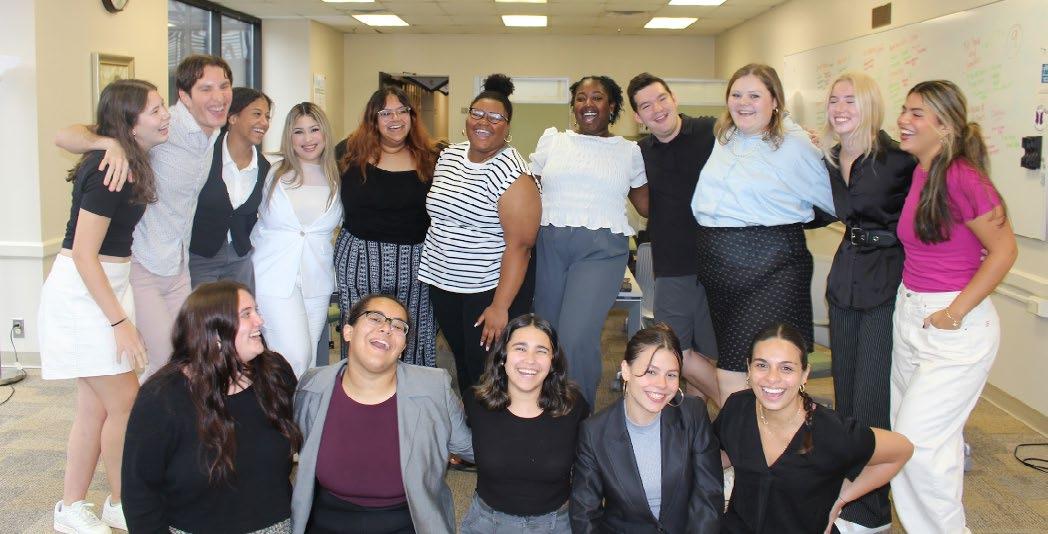
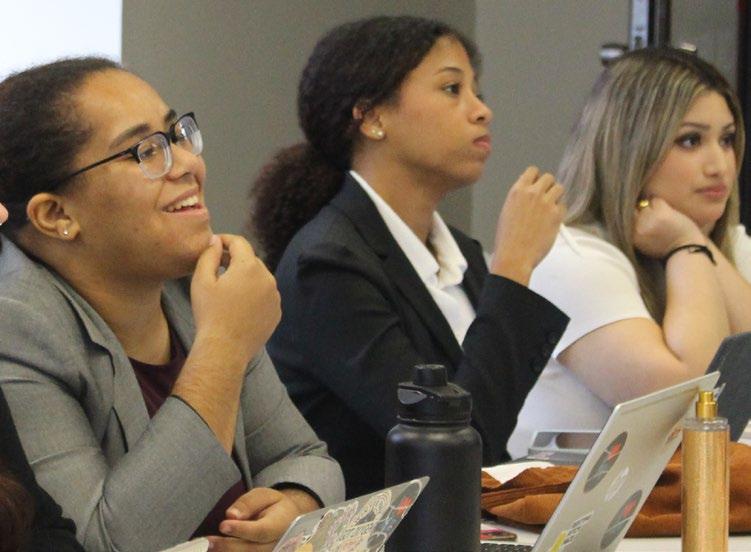
in. By offering marketing expertise, event planning, and social media management, the Donnelley Center amplifies the voices of nonprofits like Luke’s House Clinic, which primarily serves the Hispanic population by providing free healthcare consultations.
“One of our favorite projects was our annual report, which we still use,” said Crystal Roa, Social Media Manager at the clinic and a Loyola alum. “We reapplied for this semester after such a successful collaboration last fall.”
Staff members at the Donnelley Center feel a personal connection to their work. “I feel like I’m making a difference not just for any community, but for my own,” says Digital Strategy Liaison Lourdes Quevedo. The center prioritizes language access, ensuring clients can communicate in Spanish if needed. “If a client prefers to speak Spanish, we always make sure a Spanish speaker is available,” adds Digital
“I feel like I’m making a difference not just for any community, but for my own.”
- Lourdes Quevedo, Digital Strategy DC

Strategy Director Alondra Juarbe. Beyond providing services, nonprofits and the Donnelley Center celebrate and preserve the rich traditions of the Hispanic community through cultural events, workshops, and educational programs. “Every opportunity I get to engage with members from the Hispanic community is filled with unmatched joy and love,” says Firm Director Taylor Pitman. “The perspectives they share have transformed the Greater New Orleans community and Loyola.”
In a city defined by culture and resilience, nonprofits and agencies like the Donnelley Center are essential for building strong, inclusive communities. Their work ensures marginalized groups feel heard, valued, and supported, reminding us of our shared responsibility to uplift one another.
By Francisco Esteves


IThis semester, I’ve had the privilege of working at the Shawn M. Donnelley Center for Nonprofit Communications here on campus. One of my clients is the amazing Luke’s House, a nonprofit free clinic located in the heart of the city that helps underserved communities.
n a city as vibrant and diverse as New Orleans, access to quality healthcare remains a critical issue, especially for the underserved Hispanic and Latinx populations. Amid these challenges, Luke’s House, a nonprofit free clinic located in the heart of the city, helps these underserved communities.
Powered by volunteers and medical professionals, the clinic offers a wide range of services, from medical and women’s health, to vision care and immunizations. Perhaps most significantly, Luke’s House also provides prescription assistance, ensuring that patients leave with not only diagnoses but also the medications they need.
What sets Luke’s House apart is its commitment to addressing healthcare inequality for the Hispanic community, a group disproportionately affected by high medical costs and language barriers in New Orleans.
At Luke’s house, Spanish-speaking staff members work closely with patients, making the clinic a welcoming environment for those who might otherwise struggle to navigate the complex healthcare system.
As a volunteer-run teaching clinic, Luke’s House provides not only essential care but
also a training ground for the next generation of medical professionals. Volunteers gain hands-on experience in patient-centered care, learning to navigate the cultural and social factors that affect healthcare in diverse communities.
At Luke’s House, no patient is ever turned away. Whether someone is in need of a routine check-up, vaccinations, or prescription assistance, they can rely on the clinic’s doors being open. By offering all of these services for free of charge, the clinic ensures that even those without insurance or financial resources can receive the care they need.
In a city where healthcare can be expensive, Luke’s House is more than just a clinic–it’s a necessity. For the New Orleans’ hispanic and latinx communities, it represents a safe space where language, culture, and compassionate care come together to address the unique challenges we face. By providing care for free, Luke’s House continues to empower and uplift a community that is often overlooked, making healthcare more accessible for all.
Russell
My whole life has been a series of doors
Rushing to open one, rushing to not let another one close... those darn doors
Sometimes I can’t control why they open or why they close
That’s just the way life goes
But what hurts is when I have one foot in each door and it feels like the world is trying to lock me out
Lock me out for not being enough
Lock me out for being too much of one thing pero no suficiente del otro
Me miran en la tienda as I walk in to buy a hot chocolate and a bear claw
And the cashier speaks in English to me
As if she didn’t just say buenos días to the lady buying conchas and café in line before me
That lady is Hispanic
But so am I? Aren’t I?
When I am at school...
And my friends speak of their quinceañeras and their celebrations
And their trips to Mexico
I don’t have the same traditions
My Spanish is spoken with an accent I know this because of the girl in eighth grade that once made fun of me for it and how I hear the difference in my AP Spanish class
My Spanish is broken
It’s broken fragments of a language I love and yearn to speak but cannot as well as I wish
My English is good
My English is great
I do pronounce some words differently, like mi mama
For example.... Picture this
A fish swimming in the river, knowing where to go
Following the path home
I am not that fish
I do not know where to go
My father says salmon, with no L
I say salmon, with the L Es así en español
When I go visit my dad’s southern family,
they speak to me about school and what it’s like in California and how speaking Spanish is going
They don’t want me to lose it like they did generations ago
But I am not as white as they are
I am not as white as my aunt who drinks her iced tea at the crawfish boil during Mardi Gras season with my neighbors as they discuss politics
I’m not as white as my peers who talk about their ski trips and make offhanded jokes about being Mexican
I’m not Mexican. I’m Honduran Central America and North America are two different places
I may be bad at some geography, but I know that.
Mexico and Honduras are two different places
I say I’m from Honduras
But how can I be from a place I’ve only ever been as a child and in my dreams?
I spent one summer there. The longest period of time I’ve ever been there I climbed a mango tree and swam in the sea
It’s different from here
But different from there
In Mexico
Mexico and honduras aren’t the same place
I don’t have pozole, like they do in Mexico, or tamales made the same way as my friend’s abuelita’s
I have plátanos fritos for breakfast
I have pollo con loroco that mi bisabuela mama Meches loves
I have sopa de frijoles or sopa de pollo that my abuela Wootie makes even if it’s 100 degrees outside
It’s good for the soul, she once said Chicken soup can’t heal that rift in my soul though
The foot in one door, the foot in the other
I don’t seem Hispanic enough for some, I don’t seem white enough for others

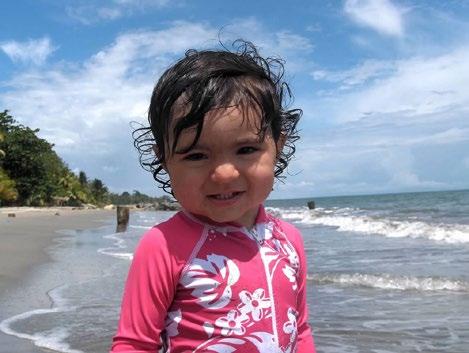


I used to see Disney princesses and American girl dolls and models who were so, so beautiful
I wanted to be them
They were skinny, they were blonde, they were white
I was a 13 year old girl with hair I didn’t know what to do with, curls I didn’t understand
I had glasses and crooked teeth and a bigger nose and curves they didn’t
I didn’t understand why I didn’t look like them or even like my aunt from my dad’s side did
But I had curly hair like my mom’s Tia did I was and I am a mix of both these worlds
Even if having one foot in one door and one in the other is no way to live a life, that’s how I do it
My life is a balancing act- I am an acrobat I balance all the time balancing out stereotypes and expectations that society and family places
I mustn’t fall into the stereotype of the Latina who fails school, who curses too much and goes to bailes yelling the lyrics to Carlos Vives I mustn’t fall into the whitewashed girl, leaving her heritage behind and losing her language
I must get good grades, I mustn’t go to parties, I must be a good daughter, tengo que hacer a todos orgullos, I must make them all proud
Am I proud?
The balancing act is a skill to master Lean too much to one side, and you’re done for
I’m not done yet
One foot in each door
That is how it’s been for me
That’s how it is for so many

When will having one foot in each door be enough??
When will those doors not be on the verge of locking
When will I have a foot in each door and see into both
Clearly and perfectly
And finally be enough?
My first language was Spanish. As a biracial child with a Black mother and a Hispanic father, this is not surprising. However, what is surprising is the fact that I do not speak Spanish anymore. It’s not that I don’t want to, but because I don’t know how to, not anymore, at least. How does one lose the ability to speak the first language they learned? I ask myself this question too often. Maybe it was that I didn’t respect the culture of the words I let carelessly pass through my lips, but then again, I was a child; how could I respect something I couldn’t understand? Maybe it was the gigantic elephant nestled between my parents. Maybe it was the disdain my siblings felt for my father. I loved him, and I loved them, but they didn’t respect the culture of my first words; how could they respect something they couldn’t understand?
The elephant that sat between my parents grew larger and larger, creating a rift beyond repair. I didn’t see my father for a long time after that. I assumed that the elephant had consumed him. Until, I did see him. It was in a ratty motel room with flowered wallpaper and ugly, brown sheets, but that didn’t matter to me—
the rose-colored glasses of adolescence clouded my judgment. I remember running into his arms so excited, so expectant. He told me he missed me, and I said, “Me too.” He whispered something in my ear, but I didn’t understand. Spanish, I thought to myself. I realized that in the years he was gone, the language we shared had left too. I blamed it on lack of practice, my teachers, my mom, but never myself. I didn’t believe it was my fault, just the circumstances of my situation, but I never blamed him. I never longed for the reunion of parents like most children, and the language barrier only became a problem when I got older. “Why don’t you want to communicate with your family, Mija? Why don’t you want to embrace your culture, Mija?” he would ask. As if the comparisons to my bilingual cousins weren’t enough. “Look at your cousins translating for you when you could do it yourself,” he would say. He blamed me. I wish the elephant had devoured him.
I resented him. I thought that if he could so easily blame me for not being able to speak a language then I could just as easily blame him for the divorce.
The man that I held so much respect for was now the subject of my rage. I could tolerate society telling me that I wasn’t “Latina enough” because I didn’t speak Spanish, but not from my own father. We had our own elephant now.
I no longer enjoyed our weekend visits and ice cream trips, but I still enjoyed seeing my Tía because every time she saw me she would tell me of the new English word she had learned. She made an effort to communicate with me, her youngest niece. She accepted me despite the language that separated us, so why couldn’t my own father?
After years of harbored anger and resentment, I finally asked him. He said, “Mija, one day, I won’t be here to translate for you. I want you to have a family after I’m gone. When you go to El Salvador, no one there will speak English, so how will you talk to your family?” he asked. I had never thought about that. It had been my misplaced anger that clouded my judgment this time. It wasn’t just about a language. It was about me. My dad wanted to leave me something that I could carry forever, but I was never open to receiving it. I was the elephant.


away
Diluvio

Canto general by Pablo Neruda
100 años de soledad El ataud de uso
La isla bajo el mar Cuando era puertorriqueña by Gabriel Garcia Marquez by Isabel Allende by Rosa Maria Britton by Esmeralda Santiago
La amortajada by Maria Luisa Bombal



